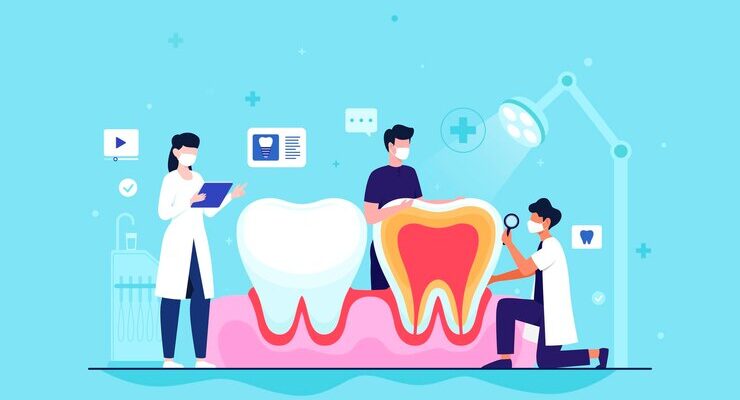
Oral health is integral to general health and well-being, extending far beyond having a bright smile. It encompasses many factors, including the health of the teeth, gums, and the entire oral-facial system that allows us to smile, speak, and chew. Good oral health can prevent dental and medical problems, enhancing overall quality of life. This article delves into the importance of oral health, standard oral health issues, preventative measures, and the connection between oral health and overall health.
The Importance of Oral Health
Oral health is crucial for several reasons. Firstly, it impacts our ability to perform fundamental activities like eating, speaking, and smiling. Pain and discomfort from dental issues can significantly reduce the quality of life and productivity. Moreover, poor oral health can lead to social stigma and affect self-esteem, especially in children and adolescents.
Secondly, oral health is linked to systemic health. The mouth is a gateway to the rest of the body, and oral infections can have wide-ranging consequences. Conditions like periodontal disease have been associated with systemic diseases such as cardiovascular disease, diabetes, and respiratory infections. Maintaining good oral health can thus play a role in preventing these conditions.
Common Oral Health Issues
Several common issues can affect oral health, each with its own set of causes and implications:
- Tooth Decay (Cavities): This is one of the most prevalent oral health problems caused by the accumulation of plaque—a sticky film of bacteria—on the teeth. Plaque produces acids that erode tooth enamel, leading to cavities. Cavities can cause pain, infection, and even tooth loss if untreated.
- Gum Disease (Periodontal Disease): Gum disease ranges from mild inflammation (gingivitis) to severe disease (periodontitis) that can result in tooth loss. It is caused by plaque buildup and can lead to swollen, bleeding gums, bad breath, and eventual tooth loss. Severe gum disease is also linked to other health issues, including heart disease and diabetes.
- Oral Cancer: This includes cancers of the lips, tongue, cheeks, floor of the mouth, and hard and soft palate. Risk factors include tobacco use, heavy alcohol consumption, and human papillomavirus (HPV) infection. Early detection is critical for effective treatment.
- Tooth Sensitivity: This involves discomfort or pain in the teeth when exposed to hot, cold, sweet, or acidic foods and drinks. It can result from worn tooth enamel, exposed tooth roots, cavities, cracked or chipped teeth, or gum disease.
- Bad Breath (Halitosis): Persistent bad breath can be caused by poor oral hygiene, gum disease, dry mouth, or other dental or medical issues. It can significantly impact social interactions and self-confidence.
Preventative Measures for Good Oral Health
Preventing oral health problems requires a combination of good daily habits and regular professional care:
- Brushing and Flossing: Brushing at least twice daily with fluoride toothpaste and flossing daily are fundamental practices for removing plaque and preventing cavities and gum disease. Proper technique is crucial for effectiveness.
- Healthy Diet: A diet low in sugary and acidic foods and drinks can prevent tooth decay. A balanced diet rich in fruits, vegetables, lean proteins, and whole grains promotes overall health, including oral health.
- Regular Dental Check-Ups: Visiting the dentist regularly for cleanings and check-ups can help detect and treat problems early. Professional cleanings remove plaque and tartar that regular brushing and flossing might miss.
- Avoiding Tobacco: Tobacco use in any form (smoking or smokeless) is a significant risk factor for oral cancer, gum disease, and tooth loss. Quitting tobacco can significantly improve oral and overall health.
- Fluoride Use: Fluoride strengthens tooth enamel and makes it more resistant to decay. Using fluoride toothpaste and drinking fluoridated water can help prevent cavities.
- Protective Gear: Using mouthguards during sports or other high-risk activities can prevent injuries to the teeth and mouth.
The Connection Between Oral Health and Overall Health
Emerging research continues to highlight the connection between oral health and overall health. Here are some of the critical links:
- Cardiovascular Disease: Studies have found a connection between gum disease and heart disease. Inflammation and infections in the mouth can lead to increased levels of inflammatory markers in the bloodstream, contributing to heart disease and stroke.
- Diabetes: There is a bidirectional relationship between diabetes and gum disease. High blood sugar levels can lead to increased plaque buildup, and severe gum disease can affect blood sugar control.
- Respiratory Infections: Bacteria from gum disease can be inhaled into the lungs, potentially causing infections such as pneumonia. This risk is particularly significant for individuals with preexisting respiratory conditions.
- Pregnancy Complications: Poor oral health has been associated with preterm birth and low birth weight. Pregnant women with gum disease are more likely to experience these complications.
- Osteoporosis: This condition weakens bones and has been linked to tooth loss and periodontal bone loss. Certain medications used to treat osteoporosis can also affect oral health.
Conclusion
Oral health is a vital aspect of overall health that requires consistent care and attention. By adopting good oral hygiene practices, maintaining a healthy diet, and seeking regular dental care, individuals can prevent many common dental problems and improve their overall well-being. The links between oral and systemic health further underscore the importance of caring for one’s mouth, teeth, and gums. As research continues to reveal the intricate connections between oral health and overall health, it becomes increasingly clear that maintaining good oral health is not just about preserving a beautiful smile—it’s about fostering a healthy body and mind.











